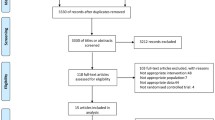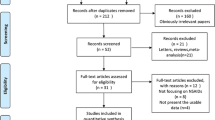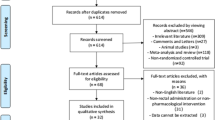Abstract
Background
Gastrointestinal toxicity of nonsteroidal anti-inflammatory drugs (NSAIDs) has been perplexing most clinicians and users of NSAIDs. Rebamipide is increasingly advocated as a candidate option for the prevention of NSAIDs induced gastrointestinal mucosal injury.
Aims
To assess the efficacy and the safety of rebamipide for the prevention and treatment of NSAID-induced gastroenteropathy.
Methods
PubMed, Embase, Web of Science, Google Scholar, the Cochrane Library, Japan Science and Technology Information Aggregator, and China Biology Medicine Disc were searched up to December 2011. Randomized controlled trials (RCTs) recruiting subjects with co-prescriptions of NSAIDs and rebamipide were eligible. Efficacy and safety of rebamipide were reevaluated, and dichotomous data were pooled to obtain relative risk (RR) with a 95 % confidence interval. Heterogeneity and publication bias were assessed by the inconsistency index statistic and funnel plot analysis, respectively.
Results
The search identified 338 citations, and 15 RCTs including 965 individuals were eligible. In general, rebamipide acted better than placebo against short-term NSAID-induced gastroduodenal injury. Separate studies showed rebamipide was equal to or not superior to traditional strategies (including PPIs, H2RA and misoprostol treatment). Especially, rebamipide showed a beneficial effect against the small bowel damage (total RR = 2.70, 95 % confidence interval = 1.02–7.16, P = 0.045) when compared with placebo group. The average incidence of adverse events was about 36.1 % (0–70.0 %) but no serious event was recorded.
Conclusions
Current evidences show rebamipide is effective and safe for defending against NSAID-induced gastroduodenal and lower-gastrointestinal injuries. However, more well-designed trials should be conducted to fully confirm the practical value of rebamipide.





Similar content being viewed by others
References
Griffin MR. Epidemiology of nonsteroidal anti-inflammatory drug-associated gastrointestinal injury. Am J Med. 1998;104:23S–29S; discussion 41S–42S.
Jones R. Nonsteroidal anti-inflammatory drug prescribing: past, present, and future. Am J Med. 2001;110:4S–7S.
Brzozowski T, Konturek PC, Konturek SJ, et al. Classic nsaid and selective cyclooxygenase (cox)-1 and cox-2 inhibitors in healing of chronic gastric ulcers. Microsc Res Tech. 2001;53:343–353.
Lichtenberger LM, Zhou Y, Dial EJ, et al. Nsaid injury to the gastrointestinal tract: Evidence that nsaids interact with phospholipids to weaken the hydrophobic surface barrier and induce the formation of unstable pores in membranes. J Pharm Pharmacol. 2006;58:1421–1428.
Laine L. Nonsteroidal anti-inflammatory drug gastropathy. Gastrointest Endosc Clin N Am. 1996;6:489–504.
Laine L. The gastrointestinal effects of nonselective nsaids and cox-2-selective inhibitors. Semin Arthritis Rheum. 2002;32:25–32.
Garcia Rodriguez LA, Hernandez-Diaz S. Risk of uncomplicated peptic ulcer among users of aspirin and nonaspirin nonsteroidal antiinflammatory drugs. Am J Epidemiol. 2004;159:23–31.
Lassen A, Hallas J, Schaffalitzky de Muckadell OB. Complicated and uncomplicated peptic ulcers in a danish county 1993–2002: a population-based cohort study. Am J Gastroenterol. 2006;101:945–953.
Lanza FL, Chan FK, Quigley EM. Guidelines for prevention of nsaid-related ulcer complications. Am J Gastroenterol. 2009;104:728–738.
Wallace JL. Nsaid gastropathy and enteropathy: distinct pathogenesis likely necessitates distinct prevention strategies. Br J Pharmacol. 2012;165:67–74.
Rostom A, Dube C, Wells G, et al. Prevention of nsaid-induced gastroduodenal ulcers. Cochrane Database Syst Rev. 2002:CD002296.
Dubois RW, Melmed GY, Henning JM, et al. Guidelines for the appropriate use of non-steroidal anti-inflammatory drugs, cyclo-oxygenase-2-specific inhibitors and proton pump inhibitors in patients requiring chronic anti-inflammatory therapy. Aliment Pharmacol Ther. 2004;19:197–208.
Smalley WE, Griffin MR, Fought RL, et al. Excess costs from gastrointestinal disease associated with nonsteroidal anti-inflammatory drugs. J Gen Intern Med. 1996;11:461–469.
Lanas A, Polo-Tomas M, Roncales P, et al. Prescription of and adherence to non-steroidal anti-inflammatory drugs and gastroprotective agents in at-risk gastrointestinal patients. Am J Gastroenterol. 2012;107:707–714.
Wallace JL. Prostaglandins, nsaids, and gastric mucosal protection: why doesn’t the stomach digest itself? Physiol Rev. 2008;88:1547–1565.
Park SC, Chun HJ, Kang CD, et al. Prevention and management of non-steroidal anti-inflammatory drugs-induced small intestinal injury. World J Gastroenterol. 2011;17:4647–4653.
Arakawa T, Watanabe T, Fukuda T, et al. Rebamipide, novel prostaglandin-inducer accelerates healing and reduces relapse of acetic acid-induced rat gastric ulcer. Comparison with cimetidine. Dig Dis Sci. 1995;40:2469–2472.
Murakami K, Okajima K, Uchiba M, et al. Rebamipide attenuates indomethacin-induced gastric mucosal lesion formation by inhibiting activation of leukocytes in rats. Dig Dis Sci. 1997;42:319–325.
Yoshikawa T, Naito Y, Tanigawa T, et al. Free radical scavenging activity of the novel anti-ulcer agent rebamipide studied by electron spin resonance. Arzneimittelforschung. 1993;43:363–366.
Banan A, Fitzpatrick L, Zhang Y, et al. Opc-compounds prevent oxidant-induced carbonylation and depolymerization of the f-actin cytoskeleton and intestinal barrier hyperpermeability. Free Radical Biol Med. 2001;30:287–298.
Kim HK, Kim JI, Kim JK, et al. Preventive effects of rebamipide on nsaid-induced gastric mucosal injury and reduction of gastric mucosal blood flow in healthy volunteers. Dig Dis Sci. 2007;52:1776–1782.
Yoshikawa T, Naito Y, Nakamura S, et al. Effect of rebamipide on lipid peroxidation and gastric mucosal injury induced by indometacin in rats. Arzneimittelforschung. 1993;43:1327–1330.
Zhu Y, Li HG, Luan SM, et al. Efficacy comparison of rebamipide and omeprazole in nsaid-related ulcer (author-translated). Strait Pharmaceutical J. 2008;20:121–122.
Naito Y, Iinuma S, Yagi N, et al. Prevention of indomethacin-induced gastric mucosal injury in helicobacter pylori-negative healthy volunteers: a comparison study rebamipide vs famotidine. J Clin Biochem Nutr. 2008;43:34–40.
Graham DY, Opekun AR, Willingham FF, et al. Visible small-intestinal mucosal injury in chronic nsaid users. Clin Gastroenterol Hepatol. 2005;3:55–59.
Mizukami K, Murakami K, Abe T, et al. Aspirin-induced small bowel injuries and the preventive effect of rebamipide. World J Gastroenterol. 2011;17:5117–5122.
Higgins JP, Green S. Cochrane handbook for systematic reviews of interventions. Version 5.1.0 [updated March 2011]. The Cochrane Collab. 2011.
Dammann HG. Effects of rebamipide on aspirin-induced gastric damage: a case-control study. Eur J Gastroenterol Hepatol. 1994;6:911–915.
Fujimori S, Takahashi Y, Gudis K, et al. Rebamipide has the potential to reduce the intensity of nsaid-induced small intestinal injury: a double-blind, randomized, controlled trial evaluated by capsule endoscopy. J Gastroenterol. 2011;46:57–64.
Kawai T, Takagi Y, Fukuzawa M, et al. The role of trefoil factor family in apparently healthy subjects administrated gastroprotective agents for the primary prevention of gastrointestinal injuries from low-dose acetylsalicylic acid: a preliminary study. J Clin Biochem Nutr. 2011;49:136–140.
Kawai T, Yamagishi T, Goto S. Circadian variations of gastrointestinal mucosal damage detected with transnasal endoscopy in apparently healthy subjects treated with low-dose aspirin (asa) for a short period. J Atheroscler Thromb. 2009;16:155–163.
Naito Y, Yoshikawa T, Iinuma S, et al. Rebamipide protects against indomethacin-induced gastric mucosal injury in healthy volunteers in a double-blind, placebo-controlled study. Dig Dis Sci. 1998;43:83S–89S.
Nishida U, Kato M, Nishida M, et al. Evaluation of small bowel blood flow in healthy subjects receiving low-dose aspirin. World J Gastroenterol. 2011;17:226–230.
Niwa Y, Nakamura M, Ohmiya N, et al. Efficacy of rebamipide for diclofenac-induced small-intestinal mucosal injuries in healthy subjects: a prospective, randomized, double-blinded, placebo-controlled, cross-over study. J Gastroenterol. 2008;43:270–276.
Ono S, Kato M, Imai A, et al. Preliminary trial of rebamipide for prevention of low-dose aspirin-induced gastric injury in healthy subjects: a randomized, double-blind, placebo-controlled, cross-over study. J Clin Biochem Nutr. 2009;45:248–253.
Park SH, Cho CS, Lee OY, et al. Comparison of prevention of nsaid-induced gastrointestinal complications by rebamipide and misoprostol: a randomized, multicenter, controlled trial-storm study. J Clin Biochem Nutr. 2007;40:148–155.
Suyata P, Bustami E, Bardiman S, et al. A comparison of efficacy between rebamipide and omeprazole in the treatment of nsaids gastropathy. Indonesian J Gastroenterol Hepatol Dig Endoscopy. 2004;5:89–94.
Yamao J, Kikuchi E, Matsumoto M, et al. Assessing the efficacy of famotidine and rebamipide in the treatment of gastric mucosal lesions in patients receiving long-term nsaid therapy (force–famotidine or rebamipide in comparison by endoscopy). J Gastroenterol. 2006;41:1178–1185.
Akamatsu T, Nagaya T, Ichikawa S, et al. Small bowel tissue concentration of rebamipide: study of two dosages in healthy subjects. J Clin Biochem Nutr. 2010;47:256–260.
Nagano Y, Matsui H, Shimokawa O, et al. Rebamipide attenuates nonsteroidal anti-inflammatory drugs (nsaid) induced lipid peroxidation by the manganese superoxide dismutase (mnsod) overexpression in gastrointestinal epithelial cells. J Physiol Pharmacol. 2012;63:137–142.
Haruma K, Ito M. Review article: clinical significance of mucosal-protective agents: acid, inflammation, carcinogenesis and rebamipide. Aliment Pharmacol Ther. 2003;18:153–159.
Silverstein FE, Graham DY, Senior JR, et al. Misoprostol reduces serious gastrointestinal complications in patients with rheumatoid arthritis receiving nonsteroidal anti-inflammatory drugs. A randomized, double-blind, placebo-controlled trial. Ann Intern Med. 1995;123:241–249.
Raskin JB, White RH, Jackson JE, et al. Misoprostol dosage in the prevention of nonsteroidal anti-inflammatory drug-induced gastric and duodenal ulcers: a comparison of three regimens. Ann Intern Med. 1995;123:344–350.
Thong-Ngam D, Chayanupatkul M, Klaikeaw N, et al. Effect of rebamipide on gastric ulcer healing caused by helicobacter pylori and/or nsaids or non nsaids-non h-pylori. J Med Assoc Thai. 2009;92:1207–1212.
Yamamoto T, Isono A, Mishina Y, et al. Gastroduodenal mucosal injury in patients taking low-dose aspirin and the role of gastric mucoprotective drugs: possible effect of rebamipide. J Clin Biochem Nutr. 2010;47:27–31.
Bombardier C, Laine L, Reicin A, et al. Comparison of upper gastrointestinal toxicity of rofecoxib and naproxen in patients with rheumatoid arthritis. Vigor study group. N Engl J Med. 2000;343:1520–1528, 1522 p following 1528.
Silverstein FE, Faich G, Goldstein JL, et al. Gastrointestinal toxicity with celecoxib vs nonsteroidal anti-inflammatory drugs for osteoarthritis and rheumatoid arthritis: the class study: a randomized controlled trial. Celecoxib long-term arthritis safety study. JAMA. 2000;284:1247–1255.
Hasegawa M, Tanaka K, Horiki N, et al. Prevention of celecoxib induced gastrointestinal events by concomitant therapy with rebamipide, gastro-protective drug. Arthritis Rheum. 2011;63:S777.
Lam SK, Hasan M, Sircus W, et al. Comparison of maximal acid output and gastrin response to meals in chinese and scottish normal and duodenal ulcer subjects. Gut. 1980;21:324–328.
Everhart JE, Kruszon-Moran D, Perez–Perez GI, et al. Seroprevalence and ethnic differences in helicobacter pylori infection among adults in the united states. J Infect Dis. 2000;181:1359–1363.
Huang JQ, Sridhar S, Hunt RH. Role of helicobacter pylori infection and non-steroidal anti-inflammatory drugs in peptic-ulcer disease: a meta-analysis. Lancet. 2002;359:14–22.
Pilotto A, Seripa D, Franceschi M, et al. Genetic susceptibility to nonsteroidal anti-inflammatory drug-related gastroduodenal bleeding: role of cytochrome p450 2c9 polymorphisms. Gastroenterology. 2007;133:465–471.
Acknowledgments
Supported by National Natural Science Foundation of China (81070291), Program for New Century Excellent Talents in University (NCET-10-0091), and Guangdong Provincial Science and Technology Projects (2010B031600243).
Conflict of interest
None.
Author information
Authors and Affiliations
Corresponding author
Additional information
S. H. Zhang and Q. Qing contributed equally to this research and are co-first authors.
Rights and permissions
About this article
Cite this article
Zhang, S., Qing, Q., Bai, Y. et al. Rebamipide Helps Defend Against Nonsteroidal Anti-Inflammatory Drugs Induced Gastroenteropathy: A Systematic Review and Meta-Analysis. Dig Dis Sci 58, 1991–2000 (2013). https://doi.org/10.1007/s10620-013-2606-0
Received:
Accepted:
Published:
Issue Date:
DOI: https://doi.org/10.1007/s10620-013-2606-0




